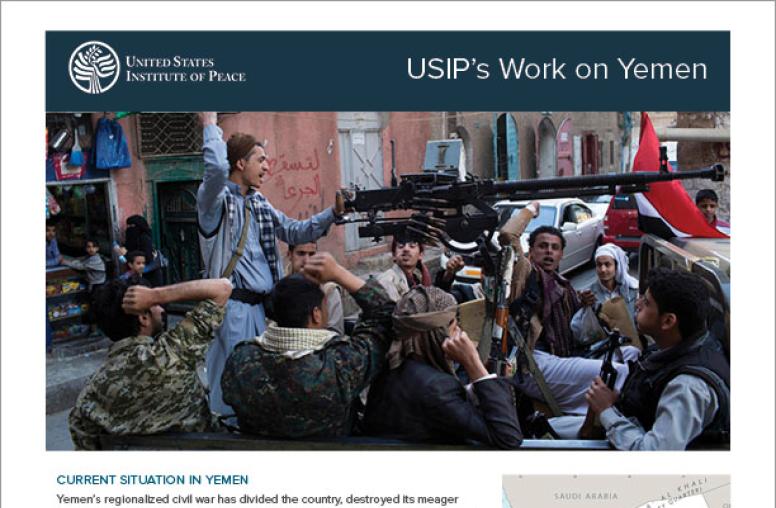 Yemen
Yemen
Yemen’s regionalized civil war has divided the country, destroyed its meager infrastructure and created one the worst humanitarian crises in the world. From the start, it has been connected to a regional competition between Saudi Arabia (which has supported the internationally backed Yemeni government) and Iran (which has supported the Houthis). A U.N.-backed truce in 2022 brought relative calm to internal frontlines and, with help from the Sultanate of Oman and Saudi Arabia, the U.N. made progress toward a roadmap agreement to end the war. This progress was upended by the Gaza war in 2023, as the Houthis attacked Israel and international shipping through the Red Sea corridor. Houthi attacks, including on commercial shipping and U.S. naval assets, frayed international support for a peace deal that would see resources flow to the group and have set the country on different trajectory.
USIP’s Work
USIP’s Yemen program provides advice to U.S. policymakers on addressing threats posed by the Houthis, including to Red Sea maritime security, and for finding a path back to a stable and durable settlement in Yemen. USIP provides a platform to bring together U.S. policymakers with Yemeni officials, academics and experts to explore these issues. We track and analyze developments in Yemen through extensive networks of field-based contacts throughout Yemen and in the Gulf states. USIP also provides analysis on Yemen through published articles and media engagements.
Featured Research & Analysis

The Current Situation in Yemen
Yemen’s regionalized civil war has divided the country, destroyed its meager infrastructure and created one the worst humanitarian crises in the world. From the start, it has been connected to a regional competition between Saudi Arabia (which has supported the internationally backed Yemeni government) and Iran (which has supported the Houthis). A U.N.-backed truce in 2022 brought relative calm to internal frontlines and, with help from the Sultanate of Oman and Saudi Arabia, the U.N. made progress toward a roadmap agreement to end the war. This progress was upended by the Gaza war in 2023, as the Houthis attacked Israel and international shipping through the Red Sea corridor. Houthi attacks, including on commercial shipping and U.S. naval assets, frayed international support for a peace deal that would see resources flow to the group and have set the country on different trajectory.

What the Houthis’ Foreign Terrorist Designation Could Mean for Yemen
The Trump administration has begun the process of redesignating Yemen’s Houthis as a foreign terrorist organization (FTO) over the groups’ firing at U.S. warships; violently overthrowing Yemen’s internationally recognized government; launching attacks against civilian infrastructure in Yemen, Saudi Arabia, the UAE and recently Israel; and attacking commercial shipping. After Hamas’s October 7 terrorist attack, the Houthis fired missiles and drones at Israel and significantly disrupted commercial shipping by attacking ships in the Red Sea. Also known as Ansar Allah, the Iran-backed group says these attacks are done in solidarity with Hamas. They have held fire since the Gaza truce took hold on January 19.

April Longley Alley on the Houthis’ Reaction to the Gaza Cease-fire
With the cease-fire in Gaza, Yemen’s Houthis have halted their “near daily” attacks on Israel. However, the Houthis have made clear that “this is a very tenuous pause,” says USIP’s April Longley Alley, adding: “They view [Gaza] as part of a larger struggle … this is going to be a medium- and long-term threat.”
Current Projects

Generation Change Fellows Program
Generation Change works with young leaders across the globe to foster collaboration, build resilience and strengthen capacity as they transform local communities.

The Red Sea in Turmoil: Peace and Security in the Horn of Africa and the Middle East
The states on the western side of the Red Sea to the south of Egypt and the Arab states from the east of Egypt through the Arabian Gulf have long been considered distinct regions. This is increasingly a distinction without a difference, however, as these states now operate more as a common political, security, and economic zone.

Religious Women Negotiating on the Frontlines
In recent years, peace processes — such as the track 2 intra-Afghan negotiations — have shown that on both a moral and practical level, women’s inclusion is essential. Women’s involvement in peace processes increases their likelihood of success and longevity and can increase legitimacy. While more literature on women contributing to mediation and negotiation efforts is slowly being produced, little attention is currently being paid to the already existing work of women who employ their faith and mobilize religious resources for peacebuilding.